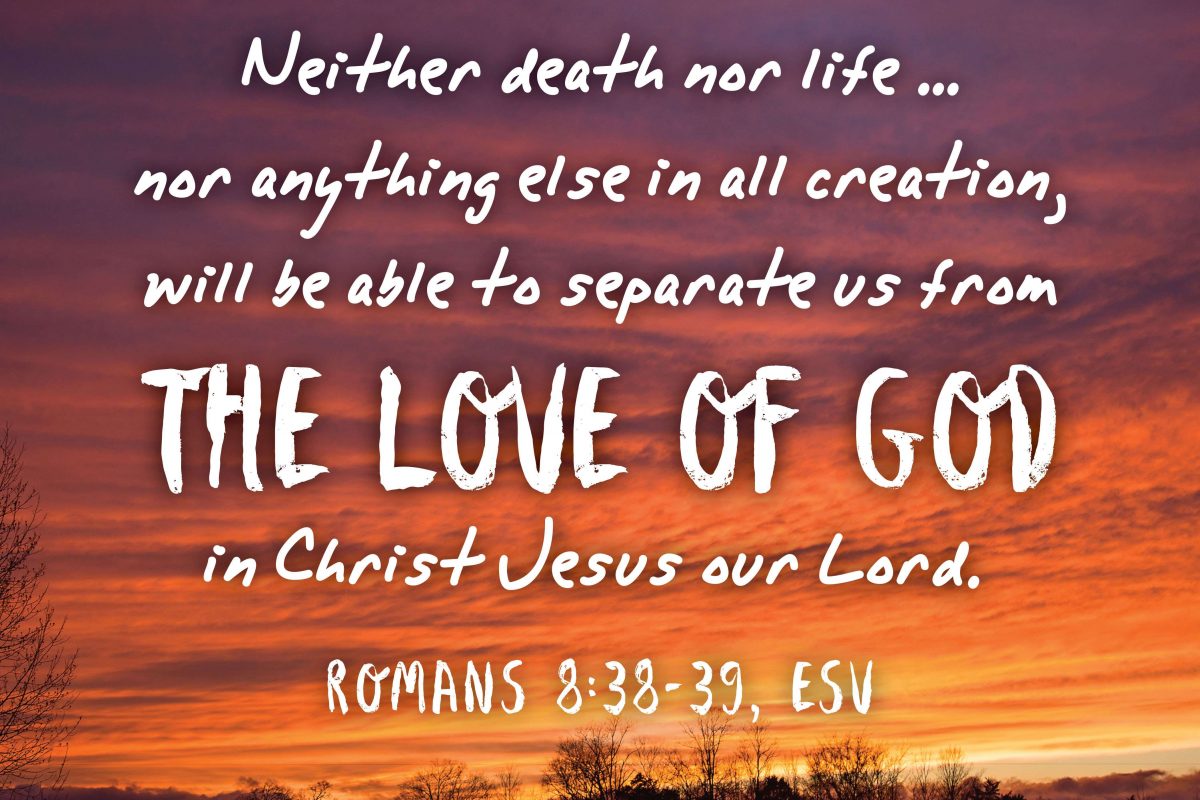
Whenever I think about suffering, two passages from St. Paul’s letter to the Romans come to mind. St. Paul knew suffering. He knew physical suffering (beaten with a cat o’ nine tails almost to death twice, stoned, tortured in prison, shipwrecked, etc.). He knew emotional suffering – rejected by his own people, slandered repeatedly, abandoned by friends. He knew spiritual suffering – imagine being Paul and hearing Jesus say, “Paul, why are you persecuting me?” Paul’s entire life of spiritual accomplishment came crashing down in one moment when Jesus spoke those words on the Damascus Road. How can one recover from devoting one’s whole life to defeating God’s purposes while at the same time believing that one was doing God’s work? But Paul did recover. He recovered from all the tragedies in his life because he had hope.
Sometimes Paul could look at his suffering and see a purpose in it. He could see that, even though God did not cause the suffering, God could use it to make Paul into a better person, into someone more like Christ. Like all of us, Paul could usually only see this is in retrospect. But he could see it. Paul tells us about this kind of suffering in Romans 5:
Therefore, since we are justified by faith, we have peace with God through our Lord Jesus Christ, 2through whom we have obtained access to this grace in which we stand; and we boast in our hope of sharing the glory of God. 3And not only that, but we also boast in our sufferings, knowing that suffering produces endurance, 4and endurance produces character, and character produces hope, 5and hope does not disappoint us, because God’s love has been poured into our hearts through the Holy Spirit that has been given to us (Romans 5:1-5).
The theologian J. Christiaan Becker called this “meaningful suffering” because we can see some good come out of it no matter how terrible the suffering was. Paul tells us “suffering produces endurance, endurance produces character, and character produces hope.” Probably all of us over ten years old have seen this in our own lives and in the lives of others. When you see someone who has gone through deep grief comfort someone else who has just lost a loved one, you see how the suffering produced a character that provided comfort and hope to someone else. When you see someone who has faced chronic pain care for someone else who is ill, you see how the endurance has shaped the caregiver to be compassionate and encouraging.
And yet, we know that this is not the whole story. Sometimes we cannot make sense of our suffering. It is too deep, too tragic, too raw, and we cannot see any endurance being produced or any character being formed. This is what J. Christiaan Becker called “meaningless suffering.” This is the suffering that we cannot wrap our minds around, the suffering that threatens to destroy rather than reform us. Romans 5 will not provide much solace in these circumstances. However, Paul also knew those kinds of circumstances and those kinds of feelings. There was only one response to that kind of deep suffering: the hope that it could be eventually redeemed because God loves us.
31What then are we to say about these things? If God is for us, who is against us. 32He who did not withhold his own Son, but gave him up for all of us, will he not with him also give us everything else? 33Who will bring any charge against God’s elect? It is God who justifies. 34Who is to condemn? It is Christ Jesus, who died, yes, who was raised, who is at the right hand of God, who indeed intercedes for us. 35Who will separate us from the love of Christ? Will hardship, or distress, or persecution, or famine, or nakedness, or peril, or sword? 36As it is written, “For your sake we are being killed all day long; we are accounted as sheep to be slaughtered.” 37No, in all these things we are more than conquerors through him who loved us. 38For I am convinced that neither death, nor life, nor angels, nor rulers, nor things present, nor things to come, nor powers, 39nor height, nor depth, nor anything else in all creation, will be able to separate us from the love of God in Christ Jesus our Lord.
(Romans 8:31-38)
Sometimes, we cannot see any good that comes out of suffering. Sometimes, there is no good that comes out of suffering – or at least the suffering is so extreme and so brutal, that assigning meaning to it seems like an affront to the one who suffered and to God. In those cases, we also have hope. Not the hope that God will use the suffering to refine our character, but the hope that nothing can separate us from God’s love, the hope that healing and wholeness will eventually come, that God will make all things new. When we are reminded that we are loved – deeply, limitlessly, eternally – by the God who made the stars, the God who formed each one of us in the womb, the God who joined us in our humanity and suffered and died on a cross, it becomes possible to endure even deep tragedy.
This is not a formula. Reading Romans 8 will not make your suffering miraculously vanish. But J. Christiaan Becker was no armchair theologian sitting in a university office somewhere musing about the different Greek words in Paul’s letters. Becker was imprisoned by the Nazis during World War II and suffered as a slave laborer. No doubt there was a great deal of physical, emotional and spiritual suffering that he endured. However, for Becker, as for Paul, God’s gifts of hope and love proved to be greater than the suffering. Not because of some great theological understanding but because Becker trusted that nothing could separate him “from the love of God in Christ Jesus our Lord.” May the love of God fill your life so that same trust is yours.
